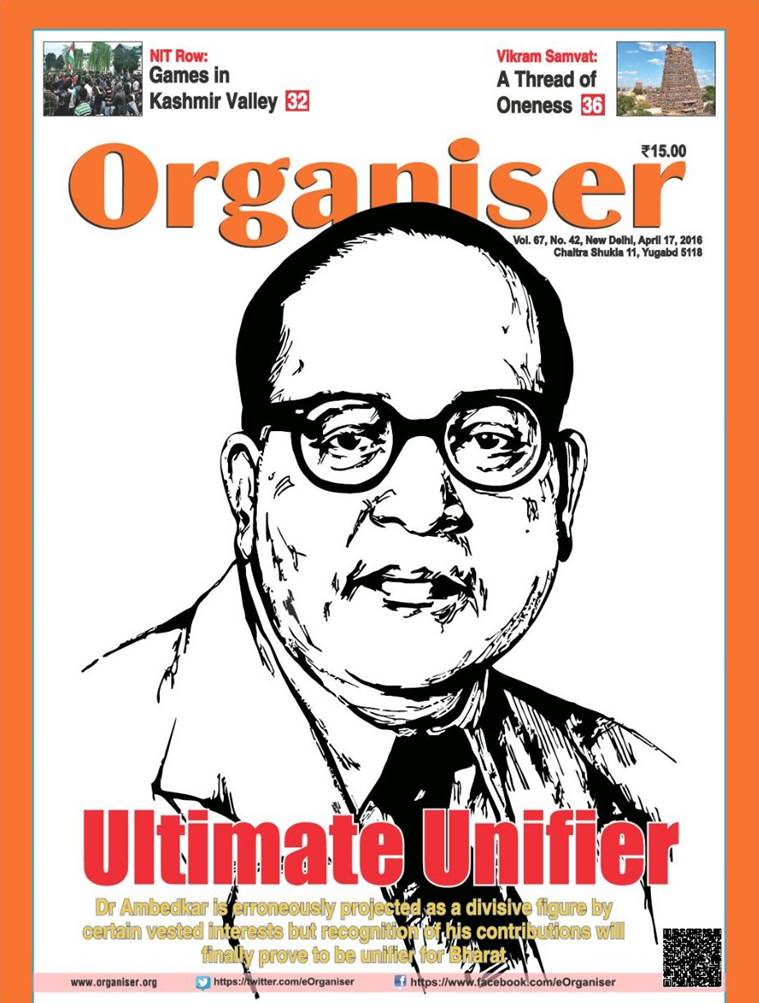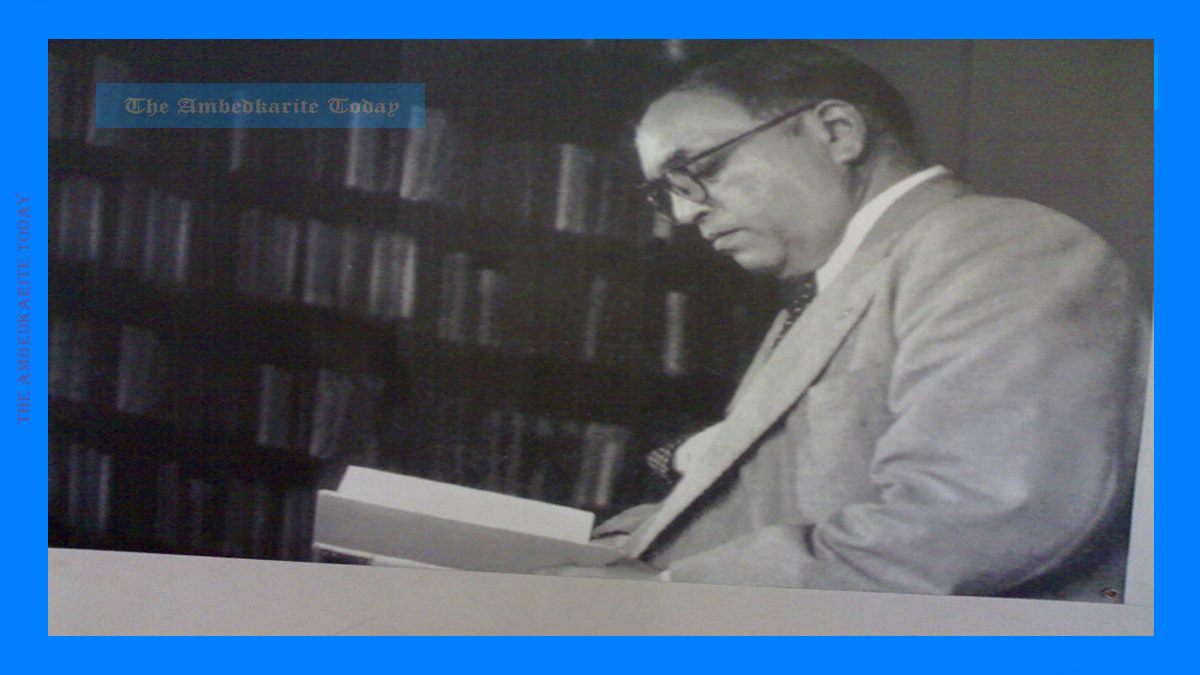RSS can change its mind about Ambedkar. But it needs a frank reckoning with why, how it got here.
The truth is that in the crucial period when Ambedkar was law minister and was framing the Constitution, the RSS reviled both him as well as his ideas.
The most recent issue of the Organiser, the English journal of the RSS, has a picture of B.R. Ambedkar on its cover, hailing him as the “Ultimate Unifier”. The issue (dated April 17, 2016) features several articles on the great man, one saying he provided the “glue for nation building”, a second arguing that his “visions and actions resembled that of Brahmo Samaj, Prarthana Samaj, Arya Samaj, etc”, a third praising his interest in workers’ rights, a fourth calling him a “timeless leader” who apparently “was not against Brahmins but against [the] Brahmanical order”.
All the essays, and the issue as a whole, are entirely celebratory. But what did the RSS and its mouthpiece think of Ambedkar and his work while he was alive? In seeking an answer, I focused on the years 1949-50, when, as law minister in the government of India, Ambedkar was both finalising the Indian Constitution as well as advocating the reform of Hindu personal laws so as to give greater rights to women.
Notably, the RSS disapproved of both efforts. The Organiser’s issue for November 30, 1949 carried an editorial on the Constitution, whose final draft had just been presented to the Constituent Assembly by Ambedkar. “The worst [thing] about the new Constitution of Bharat,” wrote the RSS mouthpiece, “is that there is nothing Bharatiya about it… [T]here is no trace of ancient Bharatiya constitutional laws, institutions, nomenclature and phraseology in it”. There was, the Organiser complained, “no mention of the unique constitutional developments in ancient Bharat. Manu’s laws were written long before Lycurgus of Sparta or Solon of Persia. To this day his laws as enunciated in the Manusmriti excite the admiration of the world and elicit spontaneous obedience and conformity [among Hindus in India]. But to our constitutional pundits that means nothing”
Ambedkar was not mentioned by name, but clearly, as the premier constitutional pundit, he was a major target for the RSS. The Sangh was even more critical of the personal law reforms proposed by Ambedkar. The RSS sarsanghchalak, M.S. Golwalkar, complained in a speech of August 1949 that the reforms piloted by Ambedkar “has nothing Bharatiya about it. The questions like those of marriage and divorce cannot be settled on the American or British model in this country. Marriage, according to Hindu culture and law is a sanskar which cannot be changed even after death and not a ‘contract’ which can be broken any time”. Golwalkar continued: “Of course some lower castes in Hindu Society in some parts of the country recognise and practise divorce by custom. But their practice cannot be treated as an ideal to be followed by all”. (Organiser, September 6, 1949).

An article in the Organiser, dated November 2, 1949, characterised the Hindu Code Bill “as a direct invasion on the faith of the Hindus”, remarking that “its provisions empowering women to divorce is revolting to the Hindu ideology”. An editorial published a month later (“The Hindu Code Bill”, the Organiser, December 7, 1949) led with this paragraph: “We oppose the Hindu Code Bill. We oppose it because it is a derogatory measure based on alien and immoral principles. It is not a Hindu Code Bill. It is anything but Hindu. We condemn it because it is a cruel and ignorant libel on Hindu laws, Hindu culture and Hindu dharma”.
The editorial then turned to whom the reforms were, in their opinion, being pushed by. It wrote: “Some widows and widowers, childless women and grandpa-grooms have combined to loosen our ancient laws for the levity of a few”. Then it specifically targeted the two architects of the bill, whom the Organiser sarcastically referred to as “Rishi Ambedkar and Maharishi Nehru”, whose reforms, it claimed, “would atomise society and infect every family with scandal, suspicion and vice”.
The Organiser thought that the bill would break up families and set brother against sister (on the question of inheritance of property). In the name of defending the wisdom of ancient Hindu lawmakers and sages, the RSS was, in effect, defending patriarchy in all its aspects. What really got its goat were the new code’s provisions to allow women to choose their marriage partners, to divorce brutal husbands, and to inherit ancestral property (all rights previously denied to them).
The RSS now launched a full-fledged attack on the Hindu Code Bill. It organised hundreds of processions, dharnas and hartals to stop the bill, these addressed by sundry sadhus and sants. One speaker said “that B.N. Rau the framer of this bill and Shri Ambedkar its pilot in the Assembly today, both declared themselves to be ‘not Hindus’ and married according to non-Hindu rites. That such men should have been entrusted with the job to ‘reform’ Hindu Dharma was a tragedy and a monstrosity”. (Organiser, December 14, 1949).
The campaign against the bill carried on for months. The Organiser carried many articles on the subject, one stating that “there is more in Hindu dharma and institutions and laws than Nehru and Ambedkar can dream of”.
In its issue of January 11, 1950, the Organiser printed a long letter by one K.D.P. Shastri complaining that an essay in another journal, Free India, had praised Ambedkar as the “Manu of Modern India”. This, said the angry Hindu letter-writer, “is an instance of depicting a Lilliput as a Brobdingnag. It borders on ridicule to put Dr Ambedkar on par with the learned and god-like Manu… ”. “Surely Dr Ambedkar’s diss-ervice in the recent past to the Hindu Religion is too well-known”, said this letter-writer, this an allusion to Ambedkar’s desire to convert out of Hinduism, and his collaboration before 1947 with the pro-Pakistan Bengali Dalit leader Jogen Mandal. Ambedkar, this RSS man insisted, “may be a good Indian now, but surely he can have no claim to be ‘Manu’ of any blessed age!”
Organisations, like individuals, have a right to change their minds. But any such change of view must be accompanied by a frank and open reckoning with why and how it happened. The truth is that in the crucial period when Ambedkar was law minister and was framing the Constitution, the RSS reviled both him as well as his ideas. As that Organiser article of November 1949 suggested, what the RSS wanted was “obedience and conformity” to what the Sangh defined as Hindu culture, tradition and values, definitions that a radical, egalitarian and anti-patriarchal reformer like Ambedkar would naturally never accept.
Editors Note- This article was written by Ramchandra Guha, a well known writer based in Bangalore. His most recent book is Gandhi Before India. This article appeared first in The Indian Express.

